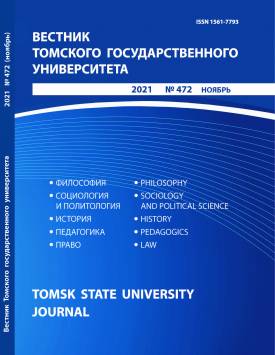Objective Time: What Are the Advantages of a Realistic Approach to the Study of Social Temporality?
In the article, the author attempts to substantiate an object-oriented approach for the study of social temporality. To solve this problem, the author takes several steps. First, the author justifies the need for a realistic approach, since it allows us to substantiate the constitutive meaning of social temporality, as well as to show the possibility of understanding time beyond the functions of social practices and/or social processes. Second, the author shows the origins of realism in the classical philosophical tradition and analyzes the possibilities of neorealism and critical realism for understanding social time. Thanks to this, a way of thinking about the social was shown based on social actors (the study of their morphogenesis increases the validity of this category). At the final step, the author shows that objects can act as an ontological basis from which thinking about social time is possible. Using Graham Harman's interpretation of the object, the author considers time as an interobjective phenomenon, a function of objects, their relations, order and aspirations for interaction. Interobjectivity postulates the constitutive value of various objects for the construction of the social. The agency and self-reference of objects, justified by Graham Harman and Levi Bryant, make it possible to avoid the need for an observer figure, which is characteristic of the established social theory and corresponds to the principles of “flat ontology”. Thus, the proposed approach allows us to think about social time based on fundamental ontological grounds, which contributes to the leveling of the distortions of the observer's view. Unlike the models analyzed above, relying on objects allows us to think of time not only as linear and unidirectional (which is especially important for understanding social temporality): a realistic intention remains. Due to the interpretation of the object that opposes materialism and idealism, the field of research of social temporality is expanding, and time itself can be thought beyond the material/ideal dichotomy; also, social time does not oppose the physical one, since it is impossible to distinguish only “social” or “physical” objects (material and ideal, artificial and natural, and so on). The epistemological vector can thus shift from the study of social practices or rhythms of social life to the potential for changes contained in objects and object-oriented interpretations of causality.
Keywords
time, social time, realism, neorealism, critical realism, object-oriented approach, flat ontology, object-oriented ontologyAuthors
| Name | Organization | |
| Golovashina Oksana V. | Ural Federal University | ovgolovashina@mail.ru |
References

Objective Time: What Are the Advantages of a Realistic Approach to the Study of Social Temporality? | Vestnik Tomskogo gosudarstvennogo universiteta – Tomsk State University Journal. 2021. № 472. DOI: 10.17223/15617793/472/3
